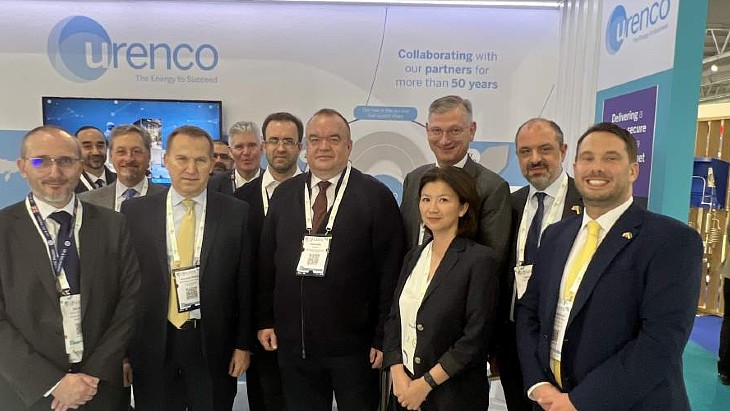The contract was signed by Energoatom President Petro Kotin (pictured above, centre) and Urenco CEO Boris Schucht (third from the right) during the World Nuclear Exhibition 2023 in Paris.
Urenco, a UK-Dutch-German company, has worked with Energoatom since 2009. Since it has ended links with Russian nuclear fuel, Energoatom's sole supplier for fuel assemblies for its power plants has been Westinghouse Electric Sweden, with the enriched uranium used for that fuel manufacture supplied by Urenco. Energotaom said that the current supply contracts with Urenco - for enriched uranium product and natural uranium hexafluoride - expire in 2025.
Kotin said: "Energoatom and Urenco already have a positive experience of cooperation, so that the signing of the contract is another step towards ensuring the energy independence of our country for years to come. Urenco's global presence ensures diversity and security of supply for customers through enrichment facilities in Germany, the Netherlands, the USA and the UK."
Schucht said: "Since the outbreak of the conflict, it has been more important than ever that Urenco plays its part to assist Ukraine to generate power for the country. We have provided support to our customer Energoatom, and its employees, and increased our supply of nuclear enrichment services to them to help enable energy independence and security of supply. This latest agreement will continue our productive working relationship."
The UK's minister for nuclear, Andrew Bowie, said the contract would "help secure Ukraine's energy independence in the years to come".
Ukraine's Energy Minister Herman Halushchenko said the manufacture of nuclear fuel was crucial for national security which was why the country was working on "ramping up such production and strengthening cooperation with international partners".
Ukraine has 15 reactors - including the six at Zaporizhzhia which have been under Russian military control since early March 2022 - whose combined capacity generates about half of its electricity. The country is looking to the West for new nuclear capacity, large and small, including an agreement with Westinghouse to build nine AP1000 reactors at established sites.





_18570.jpg)
_18938.jpg)
_33584.jpg)
_82983.jpg)





